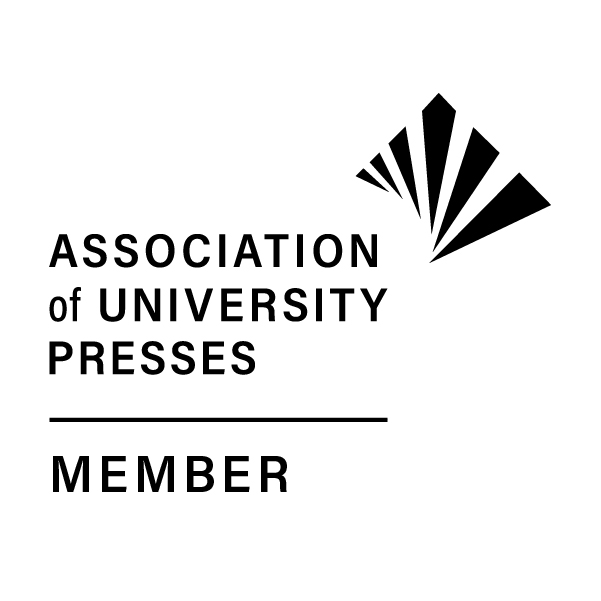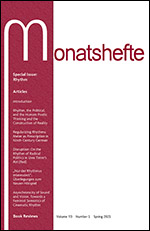
|
|
MonatshefteVolume 93, Number 4, Winter 2001 Table of ContentsTexts and DocumentsWalter Helmut Fritz ArticlesPaul Peters
Matthew Griffin
PersonaliaIntroduction, German Departments in the U.S.A., German Departments in Canada, Promotions, New Appointments, Visitors, Retirements, Necrology, Doctoral Dissertations, Summary Book ReviewsBock, Wolfgang, Walter Benjamin—Die Rettung der Nacht: Sterne, Melancholie und Messianismus. (Marcus Bullock) Bryant-Bertail, Sarah, Space and Time in Epic Theater: The Brechtian Legacy. (Norman Roessler) Duncan, Bruce, Lovers, Parricides, and Highwaymen: Aspects of Sturm und Drang Drama. (William Hanson) Eibl, Karl, Fotis Jannidis und Marianne Willems, Hrsg., Der junge Goethe in seiner Zeit. Texte und Kontexte. Sämtliche Werke, Briefe, Tagebücher und Schriften bis 1775. (Burkhard Henke) Furness, Raymond, Zarathustra’s Children: A Study of a Lost Generation of German Writers. (James Rolleston) Garber, Jörn, Wahrnehmung—Konstruktion—Text. Bilder des Wirklichen im Werk Georg Forsters. (Thomas P. Saine) Goldenbaum, Ursula und Alexander Košenina, Hrsg., Berliner Aufklärung: Kulturwissenschaftliche Studien. (Jens Kruse) Gräff, Thomas, Lyrik von der Romantik bis zur Jahrhundertwende. (Raimund Belgardt) Guarda, Sylvain, Schach von Wuthenow, Die Poggenpuhls und Stechlin: Fontanes innere Reisen in die Unterwelt. (Robert L. Jamison) Hanuschek, Sven, Therese Hörnigk und Christine Malende, Hrsg., Schriftsteller als Intellektuelle. Politik und Literatur im Kalten Krieg. (David N. Coury) Holdenried, Michaela, Hrsg., Geschriebenes Leben: Autobiographik von Frauen. (Barbara Kosta) Izenberg, Gerald N., Modernism & Masculinity: Mann, Wedekind, Kandinsky through World War I. (Rachel Freudenburg) Kirby, Rachel, The Culturally Complex Individual: Franz Werfel’s Reflections on Minority Identity and Historical Depiction in The Forty Days of Musa Dagh. (Terry R. Reisch) Konzett, Matthias, The Rhetoric of National Dissent in Thomas Bernhard, Peter Handke, and Elfriede Jelinek. (Margarete Lamb-Faffelberger) Kord, Susanne, Little Detours. The Letters and Plays of Luise Gottsched (1713–1762). (Katherine R. Goodman) McGlathery, James M., E. T. A. Hoffmann. (Friedrich Ulfers) Meurer, Hans Joachim, Cinema and National Identity in a Divided Germany 1979–1989: The Split Screen. (Sabine Hake) Morrison, Jeffrey, Winckelmann and the Notion of Aesthetic Education. (Robert Gould) Murphy, G. Ronald, The Owl, The Raven, and the Dove: The Religious Meaning of the Grimms’ Magic Fairy Tales. (Jack Zipes) O’Doherty, Paul, The Portrayal of Jews in GDR Prose Fiction. (Gregory Baer) Ragg-Kirkby, Helena, Adalbert Stifter’s Late Prose: The Mania for Moderation. (Karen J. Campbell) Rossol, Hildegard, Weltbild und Bildsprache im Werk Irmtraud Morgners. Eine Analyse unter besonderer Berücksichtigung von Amanda. Ein Hexenroman. (Sheila K. Johnson) Schwamborn, Ingrid, ed., Die letzte Partie. Stefan Zweigs Leben und Werk in Brasilien (1932–1942). (Richard C. Figge) Solms, Wilhelm, Die Moral von Grimms Märchen. (Jack Zipes) Tacconelli, Luigi, Faust. Reise in die Kulturalität: Von der textuellen Zeichenhaftigkeit zur hypertextuellen Entropie der “Rap”-performativen Ästhetik. (Richard J. Rundell) Turk, Horst, Hrsg., Kulturelle Grenzziehungen im Spiegel der Literaturen. Nationalismus, Regionalismus, Fundamentalismus. (Nina Berman) Index Volume 93 (2001)
|

